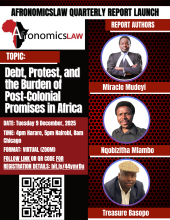Call for Papers: Decolonial Comparative Law & the Informal/Formal Economy - Cameroon 2027
Organised in partnership with the Fondation Afric’Avenir, this edition seeks to rethink the divide between the formal and informal economy through a decolonial comparative legal approach. It also aims to contribute to the consolidation of a decolonial comparative law community across the African continent and beyond. The overarching theme of the 2027 edition is decolonial comparative law and the informal/formal economy. The workshop takes the informal economy seriously as a site of legality in its own right, examined through a decolonial and comparative lens attentive to legal pluralism and situated practices.

